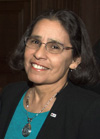UNM Law Professor, LSC Board Member Tackles Huge Gap in Legal Justice
March 3, 2015 - Tamara Williams

March 2, 2015 – Right now in the United States, 65 million people – 21 percent of the population—are eligible for legal aid, according to the Legal Services Corporation (LSC), the single largest funder of civil legal services in the country.
LSC reports that the number of people now eligible for LSC-funded assistance has risen 30 percent since 2007 to an all-time high, but federal funding per eligible client has dropped to an all-time low.
As a member of the LSC Board of Directors, University of New Mexico School of Law Emerita Professor Gloria Valencia-Weber has been tackling this gap in legal justice since 2010, when she was appointed by President Barack Obama to the Board of Directors of the LSC. She was confirmed by the U.S. Senate in December 2014 for a continuing service until 2017.
Educating the Board on Indian Law
Valencia-Weber also contributes her expertise in Native American law and communities, educating the Board on Indian law and how law services are performed in Indian Country. She has a strong record of enabling poor people to obtain necessary legal services, especially for American Indians/Native Americans. The lawyers (American Indian and non-Indian) that she trains serve public interests, including the LSC grantees that specialize in Indian law. For example, preventing unlawful home foreclosures involve more complexities in Indian Country than elsewhere.
“I try to expand the knowledge of the Board and the Executive staff by information and experiences that reveal ‘the real life’ of contemporary Native Americans,” says Valencia-Weber. “I plan learning experiences for the LSC Board and staff to expand the knowledge of Indian law and how to best serve indigent Native Americans in Indian Country.”
Program Covers Role of LSC Services to Native Americans
Currently Valencia-Weber is planning a program and presentation for the LSC Board Meeting in Minneapolis this July. The program covers the past history and current role of LSC attorneys providing services to Native American individuals and to tribal governments. “The learning opportunity will be available to many from the program I am planning,” says Valencia-Weber.

One of the speakers is UNM Law School alumnus John Echohawk (’70), the first Native American graduate from UNM. Echohawk then became an LSC Reginald Heber Smith Fellow to work on services for Native Americans, which led to the founding of the Native American Rights Fund (NARF). “His work establishing NARF had and continues to have significant impact on Indian law,” says Valencia-Weber.
Tribal governments and tribal courts in the Minnesota area have been invited to the event, and the LSC Board will also meet with the legal organizations funded by the LSC in the area. Also participating are state and federal judges, the state bar, the Supreme Court of Minnesota, and private practitioners.
Senators Heinrich, Udall Applaud Valencia-Weber’s Track Record
U.S. Senators Martin Heinrich and Tom Udall supported Valencia-Weber’s confirmation to the LSC Board, and praised her significant contributions to low-income Americans in underserved Native American communities.
“Gloria Valencia-Weber is an outstanding professor and passionate advocate,” says U.S. Senator Martin Heinrich (D-N.M.). “Her work, spanning more than two decades, has helped many underserved communities in New Mexico and across Indian Country. I congratulate Gloria on her reappointment and am confident her invaluable experience will continue to serve New Mexico and the Legal Services Corporation well.”
“Gloria Valencia-Weber has demonstrated her commitment to ensuring low-income Americans can get fair access to the justice system and to teaching law students to appreciate that all people deserve high-quality legal assistance regardless of their background,” says U.S. Senator Tom Udall (D-N.M.). “Given her dedicated work, including her specialization in Indian Law, I was proud to support her confirmation. More than one in every five Americans qualifies for civil legal assistance funded by LSC, and I'm confident Gloria will continue to stand up for all New Mexicans' rights to equal access to justice.”
